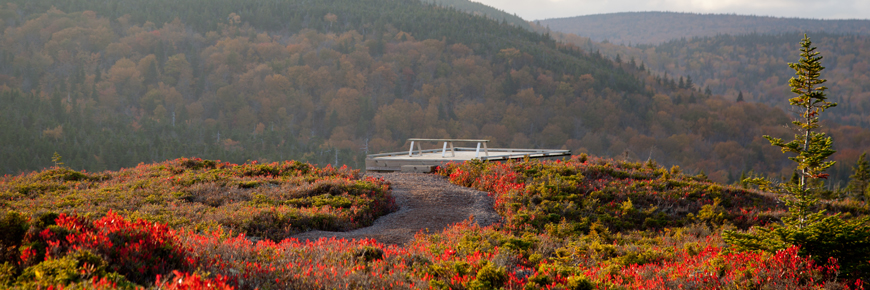
Why is biodiversity important?
Cape Breton Highlands National Park
Biodiversity is important for all species' survival. We need a variety of habitats for all the different species because each species is adapted to a certain set of environmental conditions. All species depend on each other to survive, so if one becomes extinct another species that relies on it could go extinct as well. Individual traits can allow some species to adapt to environmental changes, but many species cannot adapt if their habitat and food chains are greatly altered.
All levels of biodiversity make up an ecosystem. When biodiversity loss occurs, the health of the ecosystem will suffer. The ecosystem is less resilient when parts of it are lost to extinction or extirpation. The more parts that are lost, the less resilient it is to environmental changes and the less likely it will be able to function as a whole. For example, a car will function properly when all parts are working. If one part stops working, such as a headlight, the car can still function normally. However if the second headlight stops working, driving the car at night would be dangerous and if the engine is removed the car won't work at all. If species are going extinct in an ecosystem, it will start to not function as well and eventually not function at all.
Even one species going extinct is cause for concern, because that one species may be like the engine in the car. Even if all the rest of the parts of the car are functional, without an engine the car will not work. This is because most of the parts of the car rely on that one part in order to work. Therefore, if one species goes extinct, the whole ecosystem may not survive.
How many other species existed because of that one?
- Was it the major food for another species?
- Did it provide transportation for another species? For example certain species of freshwater mussels use certain species of fish as hosts during their larval stage. If the host fish dies, so does the mussel species.
- Did it prey upon another species, keeping that species' population from becoming overpopulated? For example, if wolves still inhabited Cape Breton they could prey on the moose population, keeping it at a viable level.
- Did it contain a particular substance not yet discovered that could cure a major human disease?
- Did it provide habitat for another species? For example, eelgrass blight caused a loss of eelgrass which was habitat for the eelgrass limpet. The eelgrass limpet is now extinct.
- Date modified :